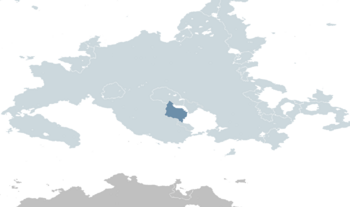Almagria: Difference between revisions
Jump to navigation
Jump to search
No edit summary |
No edit summary |
||
| Line 93: | Line 93: | ||
|population_estimate_rank = | |population_estimate_rank = | ||
|population_estimate_year = 2022 | |population_estimate_year = 2022 | ||
|population_census = | |population_census = 47,326,687 | ||
|population_census_year = 2020 | |population_census_year = 2020 | ||
|population_density_km2 = 93.55 | |population_density_km2 = 93.55 | ||
Revision as of 13:43, 12 September 2023
This article is incomplete because it is pending further input from participants, or it is a work-in-progress by one author. Please comment on this article's talk page to share your input, comments and questions. Note: To contribute to this article, you may need to seek help from the author(s) of this page. |
Motto:
| |
| Anthem: "Himno Realista" | |
| Sol de Mayo | |
 Almagria Parthenia | |
| Capital | Castillonuevo |
| Official languages | Almagrian Gallegio |
| Recognised regional languages | Madelia Bablic |
| Ethnic groups | See Ethnicity |
| Religion | State religion: Christianity (Edetanian Catholic Church) |
| Demonym(s) | Almagrian |
| Government | Federal parliamentary monarchy |
• King | Fernando VIII |
• President of the Government | Javier Montes Villablanca |
| Legislature | Cortes Generales |
| Population | |
• 2022 estimate | |
• 2020 census | 47,326,687 |
• Density | 93.55/km2 (242.3/sq mi) |
| GDP (PPP) | 2022 estimate |
• Total | |
• Per capita | $33,171 |
| HDI | 0.904 very high |
| Currency | Peseta (APS) |
| Date format | dd.mm.yyyy |
| Driving side | right |
| Calling code | +38 |
| ISO 3166 code | .AL |
Almagria (Almagrian: Almagria) officially the Kingdom of Almagria (Almagrian: Reino de Almagria) is a country located on the Edetanian Sea in Central Parthenia. It is bordered by Leciria to the south, Ibarmentudia and the Itsandia strait to the north as well as closely with Telekia to the north.
Etymology
History
Prehistory
Geography
Biodiversity
Climate
Politics and Government
Foreign Relations
Military
Administrative Divisions
Law
Law Enforcement
Economy
Primary sector
Secondary sector
Tertiary sector
Quarternary sector
Energy
Natural resources
Demographics
Urbanization
Immigration
Religion
Languages
Education
Healthcare
Culture
See Also
References

